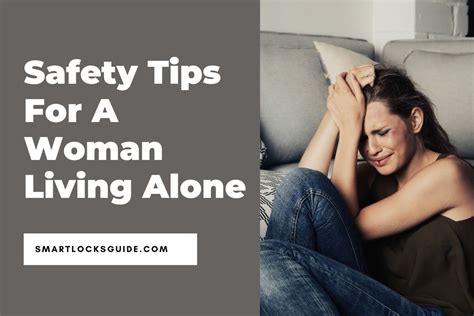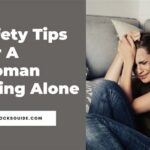
Living alone presents unique safety challenges for women. A viral social media thread highlighted a pressing need for practical safety measures, prompting women to share a wealth of advice, from home security enhancements to situational awareness techniques. The online discussion has become a vital resource for women seeking to bolster their personal safety and security.
The original social media post, fueled by concerns over personal safety, opened the floodgates to a torrent of experiences and advice. Women detailed their own strategies, learned through personal experiences and professional training, ranging from simple everyday habits to more elaborate security measures.
Home Security Enhancements:
One of the prominent themes in the shared advice centered around fortifying home security. Recommendations included:
-
Reinforcing Entry Points: Strengthening doors and windows was a recurring suggestion. Suggestions included using longer screws for door hinges and strike plates, which anchor deeper into the door frame. Installing a reinforcing strike plate for deadbolts can make it significantly harder to kick in a door.
“Invest in a good deadbolt lock and make sure it’s properly installed,” one woman advised.
Window security can be improved by installing window security film, which makes the glass more resistant to shattering. Window alarms that sound when a window is opened can also act as a deterrent.
-
Security Systems and Cameras: The discussion underscored the value of modern security systems. Many women recommended installing doorbell cameras such as Ring or Nest, which allow homeowners to monitor their front door remotely and record any activity. Outdoor security cameras can provide a broader view of the property and deter potential intruders.
“A visible security camera can be a great deterrent. Even if it’s not actively recording, the presence of a camera can make someone think twice,” commented one user.
Complete home security systems, such as ADT or SimpliSafe, offer comprehensive protection, including door and window sensors, motion detectors, and professional monitoring. These systems can automatically alert the authorities in the event of a break-in or other emergency.
-
Creating the Illusion of Occupancy: Even when away, it’s crucial to make the home appear occupied. Timers on lights can simulate normal activity patterns, turning lights on and off at different times of the day and night. Leaving a television or radio on can also create the impression that someone is home.
“I have my lights on timers and a radio that plays randomly throughout the day. It helps to deter anyone who might be watching,” one woman shared.
-
Secure Deliveries: Porch piracy is a growing concern. To prevent packages from being stolen, women suggested using package lockers, requesting deliveries to a secure location such as a neighbor’s house or an Amazon Locker, or requiring a signature for delivery.
“I always have my packages delivered to my workplace or to a neighbor who I trust,” one woman wrote.
Situational Awareness and Street Smarts:
Beyond home security, the thread emphasized the importance of situational awareness and street smarts. Recommendations included:
-
Trusting Your Instincts: A recurring theme was the importance of trusting one’s intuition. If a situation feels unsafe, it’s essential to remove oneself from it immediately.
“If something doesn’t feel right, don’t hesitate to leave. Your gut feeling is usually right,” one woman advised.
-
Avoiding Distractions: Staying alert and avoiding distractions, such as using a cell phone while walking alone, was another key recommendation. Being aware of one’s surroundings can help identify potential threats and react accordingly.
“I always take my headphones out when I’m walking alone at night. It’s important to be able to hear what’s going on around you,” one woman shared.
-
Planning Routes and Informing Others: Before heading out, especially at night, it’s wise to plan the route and let someone know where you’re going and when you expect to be back. Sharing your location with a trusted contact can provide an extra layer of security.
“I always share my location with my partner when I’m walking home alone at night,” one woman wrote.
-
Self-Defense Training: Many women recommended taking self-defense classes to learn basic techniques to protect themselves. Self-defense training can also boost confidence and empower women to stand up for themselves.
“Taking a self-defense class was one of the best things I’ve ever done. It gave me the confidence to know that I can protect myself if I need to,” commented one woman.
-
Keys in Hand: When approaching your home or car, have your keys in hand and ready to unlock the door. This prevents fumbling and allows for a quicker entry, reducing the time spent vulnerable outside.
-
Varying Routes: Avoid taking the same route every day, as this can make you predictable to potential attackers.
Digital Security:
In today’s digital age, online safety is just as important as physical safety. The thread also touched on digital security measures, including:
-
Strong Passwords and Two-Factor Authentication: Using strong, unique passwords for all online accounts and enabling two-factor authentication can significantly reduce the risk of being hacked.
“I use a password manager to generate strong passwords and I enable two-factor authentication whenever possible,” one woman shared.
-
Privacy Settings on Social Media: Adjusting privacy settings on social media platforms can limit the amount of personal information that is publicly available. Avoid sharing details about your location or travel plans.
“I keep my social media profiles private and I don’t post anything that could reveal my location or when I’m away from home,” one woman wrote.
-
Being Cautious Online: Be wary of suspicious emails or messages and avoid clicking on links from unknown sources. Phishing scams can be used to steal personal information.
Building a Support Network:
The importance of building a support network of trusted friends, family, and neighbors was another key theme.
- Neighborhood Watch: Participating in a neighborhood watch program can help create a safer community. Neighbors can look out for each other and report any suspicious activity to the authorities.
- Emergency Contacts: Keep a list of emergency contacts readily available and share it with trusted individuals.
- Check-in System: Establish a check-in system with friends or family when engaging in potentially risky activities, such as going on a date with someone new.
Additional Tips and Hacks:
The viral thread contained numerous other practical tips and hacks, including:
- Using a Doorstop: Placing a doorstop under the door can make it more difficult for someone to force their way in.
- Window Film: Applying window film to windows can make them more difficult to break.
- Personal Safety Alarms: Carrying a personal safety alarm can attract attention and deter attackers.
- Emergency Whistle: A whistle can be used to signal for help in an emergency.
- Creating a Safe Room: Designating a safe room in the home, such as a bedroom with a reinforced door and a phone, can provide a refuge in case of a break-in.
- Knowing Your Neighbors: Building relationships with your neighbors can create a sense of community and provide an extra layer of security.
The Impact of Sharing:
The online discussion underscored the power of shared experiences and collective wisdom. By sharing their own safety tips and hacks, women have created a valuable resource for others seeking to protect themselves. The thread has also sparked a broader conversation about the challenges women face and the steps they can take to feel safer in their daily lives.
Legal Considerations:
It is also important to consider the legal aspects of self-defense. Laws regarding the use of force vary by jurisdiction. It is crucial to understand your rights and responsibilities when it comes to protecting yourself and your property. Consulting with a legal professional can provide clarity on these issues.
Empowerment Through Preparedness:
Ultimately, the online discussion highlighted the importance of empowerment through preparedness. By taking proactive steps to enhance their safety and security, women can feel more confident and in control of their lives. The shared advice serves as a reminder that women are not alone in their concerns and that there are many practical measures they can take to protect themselves. The discussion’s main point shows that when women come together, they can make a real difference in their communities. The feeling of empowerment, security, and peace of mind is invaluable.
Expanding on Self-Defense:
Self-defense is not just about physical techniques; it is also about mental preparedness and awareness. Knowing how to de-escalate a situation, set boundaries, and project confidence can be just as important as knowing how to throw a punch. Self-defense courses often incorporate these elements, teaching women how to assert themselves and avoid potentially dangerous situations.
The Role of Technology:
Technology can play a significant role in enhancing personal safety. In addition to security systems and cameras, there are numerous apps designed to help women stay safe. Some apps allow users to quickly contact emergency services or trusted contacts with the push of a button. Others provide features such as location sharing, safe route tracking, and simulated phone calls to deter potential attackers.
Community Initiatives:
Beyond individual efforts, community initiatives can also play a crucial role in creating safer environments for women. Well-lit streets, safe walking paths, and increased police presence can all contribute to a sense of security. Advocating for these types of improvements in your community can help make a difference.
Addressing the Root Causes:
While it is important for women to take steps to protect themselves, it is also essential to address the root causes of violence against women. This includes challenging harmful gender stereotypes, promoting equality, and holding perpetrators accountable. Creating a safer world for women requires a collective effort from individuals, communities, and society as a whole.
The Psychological Impact of Fear:
Living in a state of constant fear can have a significant psychological impact on women. It can lead to anxiety, stress, and a diminished sense of well-being. Taking steps to enhance safety and security can help alleviate these feelings and promote a sense of empowerment and control.
Adapting to Changing Circumstances:
Safety needs can change over time, depending on factors such as age, location, and lifestyle. It is important to regularly reassess your safety measures and adapt them to your current circumstances. What works in one situation may not work in another.
The Importance of Education:
Education is key to empowering women to make informed decisions about their safety. Providing women with access to information about self-defense, situational awareness, and digital security can help them protect themselves and their communities.
The Power of Solidarity:
The online discussion demonstrated the power of solidarity among women. By sharing their experiences and offering support to one another, women can create a sense of community and empower themselves to overcome challenges. This sense of solidarity can be a powerful force for change.
Continuing the Conversation:
The conversation about women’s safety needs to continue. By raising awareness, sharing information, and advocating for change, we can create a safer world for all women. The online discussion is just a starting point. It is up to each of us to keep the conversation going and to take action to protect ourselves and our communities. Self-defense as a Mindset:
Self-defense is not merely a set of physical techniques; it’s a mindset. It’s about cultivating awareness, assertiveness, and a willingness to protect oneself. Developing this mindset can be transformative, empowering women to navigate potentially dangerous situations with confidence.
Building Confidence Through Training:
Formal self-defense training can be incredibly valuable, but even informal practices can make a difference. Practicing assertive communication, visualizing potential scenarios, and mentally rehearsing responses can all contribute to a more confident and prepared mindset.
Expanding the Definition of Self-Defense:
Self-defense encompasses a wide range of strategies, from setting verbal boundaries to employing de-escalation techniques. It’s about choosing the most appropriate response based on the specific situation. Sometimes, the best form of self-defense is simply walking away.
The Importance of De-escalation:
De-escalation techniques aim to diffuse tense situations before they escalate into violence. This might involve speaking calmly, maintaining a non-threatening posture, and acknowledging the other person’s feelings. While de-escalation is not always possible, it can be an effective way to avoid conflict.
The Role of Bystander Intervention:
Bystander intervention involves taking action when witnessing a potentially harmful situation. This could involve directly intervening, distracting the aggressor, or calling for help. Bystander intervention can be a powerful way to support others and create a safer environment for everyone.
Creating Safer Public Spaces:
Creating safer public spaces requires a multifaceted approach. This includes improving lighting, increasing security patrols, and promoting community engagement. By working together, we can make our streets and parks safer for everyone.
Addressing Systemic Issues:
Ultimately, creating a truly safe world for women requires addressing the systemic issues that contribute to violence against them. This includes challenging harmful gender norms, promoting equality, and holding perpetrators accountable.
The Long-Term Benefits of Self-Defense Training:
The benefits of self-defense training extend far beyond physical protection. It can also improve self-esteem, increase confidence, and reduce anxiety. These benefits can have a positive impact on all aspects of a woman’s life.
Integrating Self-Defense into Daily Life:
Self-defense is not something that should only be practiced in a classroom. It’s about integrating safety awareness into daily life. This might involve choosing well-lit routes, avoiding distractions while walking, and trusting your instincts.
Empowering the Next Generation:
It is crucial to empower the next generation of women with the knowledge and skills they need to protect themselves. This includes teaching them about self-defense, consent, and healthy relationships.
The Ongoing Need for Vigilance:
Creating a safer world for women is an ongoing process that requires constant vigilance. We must continue to raise awareness, share information, and advocate for change.
FAQ Section:
Q1: What are some of the most basic and effective home security measures a woman living alone can take immediately?
A1: Some immediate and effective measures include reinforcing entry points by using longer screws for door hinges and strike plates, installing a visible doorbell camera, and using timers for lights to simulate occupancy. Securing deliveries by using package lockers or requiring signatures is also crucial.
Q2: How important is self-defense training, and what kind of training is most recommended for beginners?
A2: Self-defense training is highly recommended as it empowers women with physical and mental techniques to protect themselves. For beginners, courses that focus on basic strikes, escapes, and situational awareness are ideal. It’s important to choose a reputable program that emphasizes practical application and building confidence.
Q3: What are some essential digital security practices that women should adopt to protect themselves online?
A3: Essential digital security practices include using strong, unique passwords for all online accounts, enabling two-factor authentication whenever possible, and adjusting privacy settings on social media platforms to limit the amount of personal information that is publicly available. Being cautious of suspicious emails and messages is also critical.
Q4: How can women create a supportive network within their community to enhance their safety?
A4: Women can create a supportive network by participating in neighborhood watch programs, keeping a list of emergency contacts readily available, and establishing a check-in system with friends or family when engaging in potentially risky activities. Building relationships with neighbors can also foster a sense of community and provide an extra layer of security.
Q5: What legal considerations should women be aware of regarding self-defense, and where can they seek further information on this?
A5: Women should be aware that laws regarding the use of force vary by jurisdiction. It’s crucial to understand your rights and responsibilities when it comes to protecting yourself and your property. Consulting with a legal professional or referring to local law enforcement agencies can provide clarity on these issues and provide insights on specific regional restrictions.









